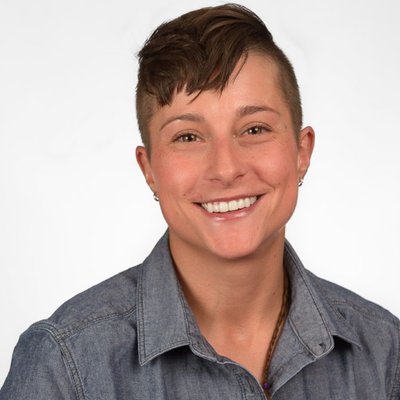Lindsey Conrow had hit an obstacle in her doctoral research at Arizona State University when the new PLuS Alliance initiative cleared the way for her to move forward.
Conrow was able to complete her PhD in geography from the School of Geographical Sciences and Urban Planning thanks to ASU’s partnership with UNSW Sydney in Australia and King’s College London.
“I was interested in pursuing spatial analytics, the math side of geography,” she said, especially data about bicycling, one of her passions. But she was finding it impossible to acquire data she could analyze. There are several phone apps that record users’ bike rides, but those companies charge tens of thousands of dollars for the data sets.
After the PLuS Alliance research collaboration launched in early 2016, Conrow’s adviser, Elizabeth Wentz, professor in the School of Geographical Sciences and Urban Planning, discovered that a team at UNSW Sydney had a set of data about bicycling that needed to be formatted.
Lindsey Conrow, who is graduating with her doctoral degree, is the first graduate whose work was advanced through the PLuS Alliance.
That opened the door for Conrow, who completed her dissertation and is graduating May 7.
“Finally these are the data I needed to answer the questions I had about how people bike around urban areas,” said Conrow, who spent 10 weeks in Sydney, Australia, in the summer of 2016 getting the data set ready for analysis. The information came from an app used locally.
“When they go for a ride, they record it and it creates a GPS trace, tracking how fast, where they’re going and the purpose of the ride, whether it’s for commuting or recreation,” she said.
The regional transportation agency had purchased the data from the app company and allowed UNSW Sydney to access it.
“My research had kind of stagnated because of the lack of data, but when I got access to it in Australia, that’s what really pushed it to the next level,” Conrow said.
Wentz said she was interested in how the new partnership would work.
“I was keen to partner with the researchers at UNSW Sydney, and I knew I couldn’t spend a lot of time there and I felt that if Lindsey could spend a substantial amount of time there, she would be much more engaged in the research process,” said Wentz, who also is dean of social sciences in the College of Liberal Arts and Sciences.
“I told her to come back with a dissertation topic and she did.”
After she returned, Conrow worked on the three journal articles that make up her dissertation, one of which has already been published in Applied Geography. Two of the studies analyze the app data from Sydney, while the third looks at bicycling data in Tempe.
“We were looking at whether bicycle infrastructure is related to housing prices,” she said. “Some people argue that if you have bicycle lanes in your neighborhood, it could reduce your home value.
“The main finding was that homes in an area with dense bicycle infrastructure tend to be higher-valued homes,” she said, cautioning that the result doesn’t mean that adding a bike lane will increase the value of a home. She said the higher value was probably related to factors such as low traffic, low speed limit and shade trees, which encourage higher ridership.
A first-generation college student, Conrow has spent five years at ASU working on her doctorate and this summer, she’ll move to Zurich for a two-year fellowship studying mobility issues among an aging population. She’d like to eventually become a tenure-track professor studying urban transportation.
“Biking, walking, light rail, cars — all of these thing work together to make sure we can get around. But not everybody has the same access, so if we could work on transportation equity that would be great,” she said.
“And we need to work on infrastructure to get people out of their cars and biking and walking.”
Conrow was able to accelerate her work through the PLuS Alliance, and later this year, the partnership will offer a more formal way to advance global researchers. Next fall, the PLuS Alliance will launch a pilot program for PLuS International Interdisciplinary Researchers (PIIR). Ten researchers, either doctoral candidates or within five years post-doctoral, from each of the three universities will take a yearlong course that will include online content and workshops in London and Sydney. The researchers will be trained in the skills needed for global transdisciplinary work, and they’ll focus on the areas of sustainability, technology, social justice and global health.
More Sun Devil community

2025 in pictures: ASU photographers share some of their favorite moments of the year
From football games to lab work to graduation, our photographers in Media Relations and Strategic Communications see it all throughout the course of the year.So we wanted to know — what were…

Finishing what she started: ASU grads’ lifelong pursuit of education becomes a reality
Makita Hogans has tried her hand in higher education for years, but her commitment to her newly born son put her vision for a degree on the back burner.“I made the choice to raise my son. His future…

NASA Brooke Owens Fellow, Space Grant alum awarded Dean’s Medal for approach to science education
Lindsey Tober was looking for a way to combine her creative side with her passion for science when she found the technological leadership degree at Arizona State University and ultimately used it to…

